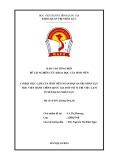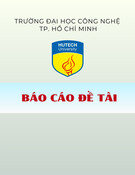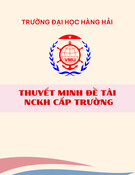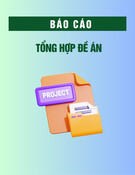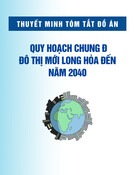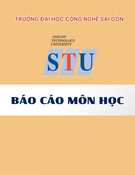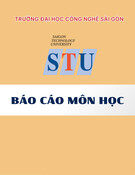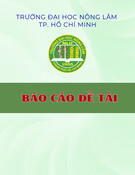
Project Title
Code: 2.6
Improvement of Vietnam’s capacity for teaching and
research in horticultural crop production including
vegetables and seeds in order to enhance rural
development, through the development of productive
partnerships between research and training institutions
in Vietnam and NSW Agriculture
Australian Personnel Dr. Quoc Vong Nguyen
Australian Institution NSW Agriculture
Vietnam Institution Research Institute of Fruits & Vegetables, Hanoi; Hue
University of Agriculture & Forestry - Hue and Institute of
Agricultural Science of South Vietnam, Hochiminh City
Project Duration July 2001 to June 2003
Project Description
The objective of this program is to improve Vietnam’s capacity for teaching and
conducting research in modern horticultural crop production with a particular focus
on vegetables. This should enhance the ability of Vietnam to promote rural
development in these industries and improve the efficiency of and quality of vegetable
production. The project aims to achieve this by:
i) Vietnamese horticultural scientists will visit NSW to collaborate in joint-
research projects and to review and learn about the Australian vegetable
industry;
ii) ii) NSW Agricultural scientists will visit Vietnam to lecture and to work
for a period with Vietnamese agricultural scientists and students in
horticultural research projects; and
iii) iii) research, training and trading liaisons will be enhanced between
Vietnam and Australia.
Objectives
The objective of this program is to improve Vietnam’s capacity for teaching and
research in horticultural crop production including vegetables and seeds. This will in
turn enhance their scientific and practical knowledge to help rural development,
resulting in efficient production and quality of vegetables in Vietnam, through:
a) Horticultural scientists from Vietnamese research institutions and Universities
visiting NSW Agriculture to work for a period in Australian research institutions and
to inspect and learn about the Australian vegetable industry;
b) NSW Agricultural scientists visiting Vietnam to lecture, train and to work with
Vietnamese agricultural students and conduct research on small highly focused
horticultural projects.
c) NSW and Vietnamese Agricultural scientists would, through a strong link with
each other in both public and private sectors, help to facilitate research, training and

marketing liaisons between Australia and Vietnam to promote improved vegetable
production in Vietnam.
Outputs and Performance indicators
Outputs Performance Indicators
♦
♦
♦
♦
Vietnamese scientists who visit Australia to study
the Australian vegetable industry will obtain
knowledge of modern growing techniques,
tomato and cucumber breeding and seed
production techniques, pest and disease
management, quality assurance, post-harvest
management, packaging technologies and
wholesale and export marketing
A 2-year research demonstration entitled
"Evaluation of hydroponic systems and growing
techniques for greenhouse vegetables such as
tomatoes (Lycopersicon esculentum Mill.),
cucumber (Cucumis sativus L.) and Asian
vegetables" will be organised at the NCGH-
Gosford, RIFV-Hanoi and IAS-HoChiMinh, for
both Australian and Vietnamese scientists to
work as a joint research project. Outputs of this
research will include improved hydroponic
systems, suitable varieties, IPM systems and a
better understanding of the constraining factors
of greenhouse production.
NSW Agricultural scientists during their visit to
Vietnam (plant breeder, entomologist and plant
pathologist) will assess Vietnamese vegetable
cultivars with a reputation for high insect and
disease resistance for possible use under
Australian growing conditions.
At Hue University of Agriculture and Forestry,
NSW Agricultural scientists will give lectures on
Plant Breeding, Pests and Diseases of Vegetables
Crops for the 4th year students. The NSW
Agricultural scientists will also assist in
supervising graduate theses for the university’s
4th year students. The ultimate performance
indicators for this project will be improved
vegetable production in Vietnam in terms of a
great variety of vegetables, improved efficiency
of production, higher quality of product,
reduction in food safety problems and greater
exports.
1) the successful completion of
experimental projects in Australia
and Vietnam
2) the publishing of scientific papers,
reports, technical guidelines and
newsletters
3) the publishing of extension material
in Vietnamese for use both in
Australia and Vietnam
4) the successful examination and
completion of graduate theses of
Vietnamese 4th year students
5) the publication of a final report on the
project recommending, if appropriate,
processes to improve training of
scientists and commercial
horticulturists in Vietnam,
opportunities for improved
production, food safety and post
harvest management methods for the
Vietnamese industry and
recommendations for Australian
horticultural industries in terms of
training for Non English Speaking
Background farmers and availability
of alternative vegetables.

PROJECT COMPLETION REPORT
Executive Summary
The capacity of Vietnam to improve vegetable production and vegetable quality has
increased significantly as a result of this project. Achievements include:
i) Improved research and teaching skills of the Vietnamese horticultural
scientists who visited Australia to collaborate in joint research projects and to
learn about the Australian vegetable industry. The sophisticated technology
used by NSW Agriculture was reviewed for potential adoption in Vietnam. A
large number of successful experimental trials, seminars and workshops on
safe & quality vegetable production were organised by these scientists in
Vietnam based on their experience in Australia. The NSW Agriculture
training methodology and the Australian vegetable production techniques have
made an impact on the Vietnamese Government as well as Vietnamese
horticultural industry.
ii) Growing systems for the production of safe & high quality vegetables using
net-houses, grafted crops grown in cocopeat, and grown under trickle
irrigation have been implemented widely in Vietnam, particularly in the
southern parts of Vietnam and Lam Dong highland. Implementation has
directly resulted from the two-years of research demonstration trials that were
organised in both Vietnam and Australia.
iii) Inproved capacity for building agriculture and rural development has occurred
through seminars, lectures, workshops, field days etc. These events have
attracted participants from all Vietnamese horticultural sectors such as:
vegetable growers, university horticultural educators & students, institutional
research workers and the local Agricultural Ministry’s executive officers
(directors, deputy directors, extension horticulturists). Activities have included
participants from Hanoi, Hue, Hochiminh cities and approximately 15
provinces in the North Central, Central, South Central and South Vietnam as
well as from Laos and Cambodian Governments. The project has also
established a relationship with the Asian Regional Centre (ARC) of the Asian
Vegetable Research & Development Centre (AVRDC) for future co-operation.
iv) Survey of major pests and diseases in vegetables in Vietnam were conducted
by the NSW Agriculture scientists. In addition, one cultivar each of tomato
(Lycopersicon esculentum Mill.) and eggplant (Solanum melongena L.) with a
reputation for disease resistance (Fusarium wilt, Bacterial wilt), and one
variety each of gourd (Lagenaria siceraria STANDLEY var. hispida HARA)
and Japanese kabocha (Cucurbita moschate DUCH.) with a reputation of
resistance to Phythium were collected by the NSW Agriculture scientists.
These varieties are now being used as rootstocks for the Australian greenhouse
tomatoes and cucumber industries.

v) “Cocopeat” which is made from coir dust, was used as the growing media in
demonstration experimental trials at the National Centre for Greenhouse
Horticulture, Gosford (NCGH), has been identified as a potential new product
for Vietnam. Coconut coir is abundant in Vietnam and the cocopeat industry
could be a potential export market worth approximately 1 million m3 a year,
but it needs technical assistance with quality assurance from Australia.
vi) Excellent working relationship with the Vietnamese Government and the
collaborating research organisations in Hanoi, Hue and Hochiminh were
satisfied with the project’s achievements (Appendix 1). The Vietnamese
Government and Ministry of Agriculture & Rural Development were pleased
with the projects’s achievements and have strongly encouraged the
development of a new CARD project focussing on:
• Assisting Vietnam to create a model of quality & safe vegetable
production nation wide (greenhouse, hydroponic, IPM, QA, post-
harvest and packaging);
• Assisting Vietnam to research and manufacture agricultural by-
products such as “Cocopeat” and other growing materials for the
horticultural industry; and
• Assisting Vietnam to train its horticulturists both in Government
and NGO levels;
vii) In response to the requests of the Vietnamese Government, a subsequent
research project (CARD-Round 2) has been developed. It is:
Project CARD-Round 2. The development of Vietnamese horticultural coir
dust products for the production of high quality and safe vegetables, through
improving Vietnam’s teaching and research capabilities, facilitated by
collaboration between research and training institutions in Vietnam and NSW
Agriculture (ChÜÖng trình h®p tác gi»a ViŒt Nam và B¶ Nông NghiŒp
NSW Ç‹ nâng cao næng l¿c giäng dåy và nghiên cÙu ti‰n ljn viŒc phát
tri‹n mô hình sän xuÃt rau an toàn công nghŒ cao và xây d¿ng kÏ nghŒ
møn xÖ dØa, góp phÀn vào viŒc phát tri‹n nông thôn ViŒt Nam ).
The above research proposal will be submitted to AusAID.
Performance of the lead and partner institutions
NSW Agriculture – Australia:
6) The successful completion of four demonstration experimental trials on
hydroponic cucumbers, tomatoes and Asian vegetables at the National Centre
for Greenhouse Horticulture, Gosford NSW;
7) Dissemination of information through the publishing of two scientific papers,
nine reports, one technical guideline in Vietnamese language on cocopeat and
one newsletter in Vietnamese;
8) The collecting of information on major insects & diseases of vegetables in
Vietnam for subsequent publishing in Vietnamese for use in Vietnam and since

many pests are also found in Australia it will be of benefit to Vietnamese
vegetable growers in Australia;
9) The publication of a final report on the project recommending processes to
improve the training of scientists and commercial horticulturists in Vietnam,
opportunities for improved production, food safety and post harvest
management methods for the Vietnamese industry, and recommendations for
Australian horticultural industries in terms of training for non-English
Speaking Background farmers and availability of alternative vegetables.
Vietnam partner institutions:
10) The successful completion of five demonstration experimental trials on
hydroponic cucumber, tomatoes and Asian vegetables at the Research Institute
of Fruits & Vegetables, Hanoi; Hue University of Agriculture & Forestry, Hue
and Institute of Agricultural Science of South Vietnam, Hochiminh;
11) The successful examination of 11 M.Sc. candidates and completion of 29
graduate theses of Vietnamese 4th year students at Hue University of
Agricultue & Forestry, Hue;
12) The successful completion of three workshops which were organised in Quang
Binh on 20 & 21 December 2002 , Nha Trang on 23, 24 & 25 December 2002
and Long Xuyen on 25 July 2003 to train almost 160 local agricultural
ministry’s executive officers (directors, deputy director, manager, extension
horticulturist), representing 15 provinces in the North Central, Central, South
Central and South Vietnam in safe & high quality vegetable production.
Representatives from Laos and Cambodian Governments were also invited and
participated in the workshops. The workshops were run by the horticultural
scientists who had participated in the 4-week training in Australia in
September/October 2001 and 2002.
13) The publication of a Final Report in Vietnamese on the project recommending
processes to improve training of scientists and commercial horticulturists in
Vietnam and recommendations for Australian horticultural industries in terms
of training for non-English Speaking Background farmers and availability of
alternative vegetables.
1.0 Project Description
1.1 Background and preparation
On a visit to Australia in November 1999, Professor Ngo The Dan, the then
Vice Minister of the Ministry of Agriculture & Rural Development, Vietnam
approached Dr. Nguyen of NSW Agriculture requesting co-operation in a
research and training program of mutual benefit for both Vietnam and
Australia for vegetable crops. The Vietnamese government were concerned
that the Vietnamese people were not growing enough or eating enough
vegetables, that there have been many deaths directly attributed to
contaminated vegetables, that there is underemployment in the rural sector.
They have had success in developing and adopting more modern techniques
for rice production and are now interested in developing vegetable production
with international collaboration. They saw Australia as a source of help and
expertise and a particularly good opportunity to work with Dr Nguyen and
NSW Agriculture. This AusAID submission was developed in response to
Vice Minister Prof. Ngo’s request and in further consultation with Vietnam’s



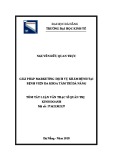
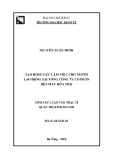
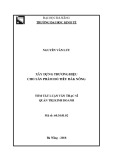
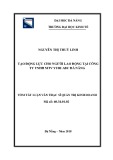
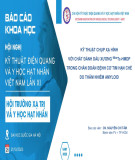
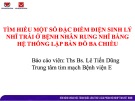
![Hình ảnh học bệnh não mạch máu nhỏ: Báo cáo [Năm]](https://cdn.tailieu.vn/images/document/thumbnail/2024/20240705/sanhobien01/135x160/1985290001.jpg)
